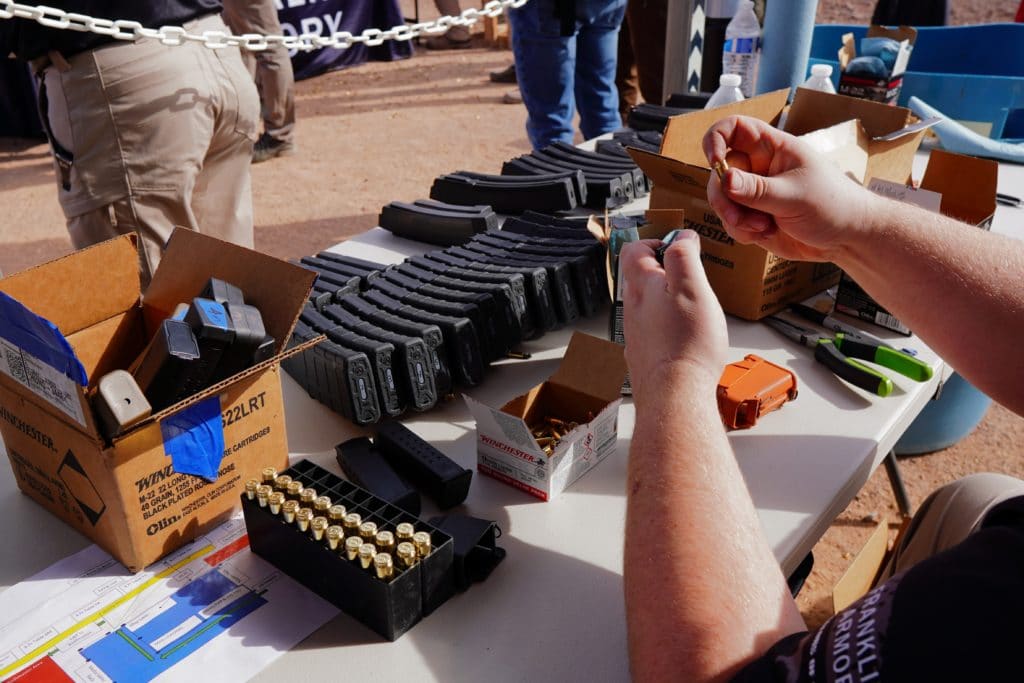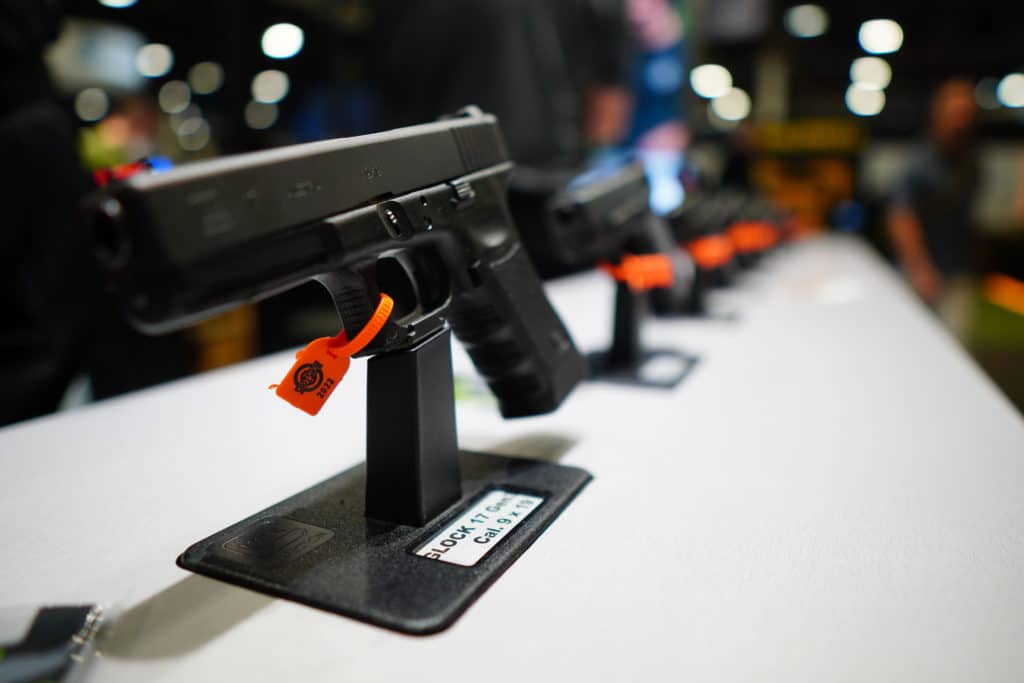The election is over. The key races have been decided. We’ve talked about what the impact on gun policy will likely be, and we’ll keep following it as the election results turn into new legislation and laws. Now, though, it’s time to bring gun litigation back into focus.
Some of that litigation gives us a glimpse into how election results are going to turn into new laws. Or maybe not. Oregon’s gun-control initiative has passed, but the ordeal it’s created has only just begun. Contributing Writer Jake Fogleman explains how the whole thing appears to be headed for a cliff less than a month out on the horizon.
Then I take a look at the first gun ruling from a federal appeals court. The Third Circuit used some very questionable rationalizations to uphold the ban on non-violent felons owning guns, including appealing directly to explicitly-bigoted gun bans. But even if the Supreme Court doesn’t agree with the Third Circuit’s logic that may not entice them to intervene for another, more practical reason.
Plus, NY State Jewish Gun Club founder Tzvi Waldman explains his group’s suit to end the synagogue gun ban on the podcast.

Analysis: Why Backers of Oregon’s Measure 114 May Grow to Regret the Initiative [Member Exclusive]
By Jake Fogleman
Gun-control advocates secured a big win when Oregon’s Measure 114 passed. But it could become a major headache for them before all is said and done.
The Associated Press officially called the race in favor of Measure 114 earlier this week. By a slim 1.6 percent margin, Oregonians voted in a new permit-to-purchase requirement for all gun sales and a ban on ammunition magazines capable of holding more than ten rounds.
To receive a permit, a resident must apply with their local sheriff or police department, pay a $65 fee, pay for and complete an approved firearms training course, submit a photo ID, be fingerprinted, and pass a state-run criminal background check in addition to the federal background check required on gun sales by licensed dealers. The measure directs Oregon State Police to create and maintain a database of all permit-to-purchase applicant information, which opponents of the law have charged would function as a de facto gun registry.
Additionally, residents who currently own magazines capable of holding more than ten rounds–many of which come standard with commonly-owned handguns and rifles–would only be allowed to use them at shooting ranges and on private land.
It institutes some of the strictest gun laws in the country by direct vote, even if by less than most might expect in a deep blue state. That’s still a significant win for gun-control advocates.
But getting the measure passed was only the first step. The implementation might show the juice wasn’t worth the squeeze.
While the measure mandates systems and databases for processing purchase permits, local law enforcement agencies have been left with little time, funding, or guidance on how exactly to create and manage such systems.
The measure did not earmark any money to fund the databases or staffing needed to process the background checks or operate the permitting service. State law enforcement officials have said the $65 fee built into the measure would be insufficient to fund those efforts.
Adding to the disorder is the fact that the measure’s backers were misguided about when the law would actually take effect. Operating under the assumption that it would take effect on January 15 of next year, the backers assumed state agencies had plenty of time to build out the required processes of the law (something even then many sheriffs disputed).
However, the Secretary of State’s office has since clarified (and the Oregon State Police has confirmed to The Reload) that the law will actually take effect on December 8, more than a month sooner than anticipated. The measure’s backers sought to have Governor Kate Brown (D.) delay its implementation date, but the Governor’s office declared that she did not have to power to do so.
That means the state’s law enforcement agencies, already understaffed, underfunded, and ill-prepared to handle the measure’s new mandates, will have to figure it out on an expedited timeline. The Oregon State Sherriff’s Association is already warning residents that the law will be impossible to implement on the mandated timeline, likely resulting in a complete halting of gun sales across the state after December 8.
“As of the date the measure goes into effect we believe that all firearms sales by dealers, at gun shows and most private transfers (other than to a close relative) in Oregon will immediately stop,” the group said in a statement. “The revenue generated by the permits ($65 for each permit) will not come close to fully funding the required processes. In most law enforcement agencies there is no personnel or money to fund this required program.”
Gun-rights groups are already chomping at the bit to file a lawsuit against Measure 114. When they do, and if the predicted moratorium on all legal gun sales comes to pass, securing emergency injunctive relief in court should be a slam-dunk. Oregon will then have to demonstrate that a requirement for purchase permits and a ban on commonly-owned magazines is consistent with the nation’s history and tradition of gun regulation, as the Supreme Court established in NYSRPA v Bruen. That will certainly be a tall order.
The ensuing legal battle over the measure seems particularly poised to catch the attention of the Supreme Court. Multiple federal courts across the country are already evaluating the legality of magazine bans in light of Bruen, including two cases out of California and New Jersey upholding bans that the Court specifically said should be revisited. After evaluating the legality of requiring permits to carry a gun in public as the Court did in Bruen, examining the legality of requiring permits for gun ownership is a natural next step for the Court to take.
In the meantime, the only other practical effect of Measure 114’s passage is sparking a return to record-level gun sales in the Beaver state. Since November eighth, the Oregon State Police have reported a massive 382% increase in firearm background checks. They’ve averaged over 4,000 checks per day.
Much will ultimately depend on how the courts decide to apply Bruen to Measure 114 and the mess that’s currently unfolding in Oregon. But when all is said and done, there’s a distinct possibility that all it will have accomplished is a brief boost in gun sales and a new court precedent favorable to gun-rights advocates.
Podcast: New York State Jewish Gun Club Founder Explains Their Suit Against the State’s Synagogue Gun Ban [Member Early Access]
By Stephen Gutowski
This week on the podcast, we’re discussing one of the many lawsuits currently trying to take down New York’s latest gun-carry restrictions.
Joining us on the show is Tzvi Waldman to discuss the New York State Jewish Gun Club’s challenge to the ban on guns in places of worship. He argued the law, which keeps even those who are licensed by the state and authorized by their faith leader to carry from doing so, is unconstitutional. And he said it puts worshipers at greater risk of attack.
Waldman said the law forces Jewish worshipers to choose between their First Amendment and Second Amendment rights. He noted the new restriction, which wasn’t part of the state’s previously-struck-down law, comes as antisemitism is on the rise. He said both threats and acts of violence against Jews have increased in recent months.
Ultimately, he said the group plans to fight this case all the way up to the Supreme Court if necessary.
He also talked at length about how the club has tried to destigmatize gun ownership for a lot of Jews. He said the Holocaust has served as both a catalyst for Jews to arm themselves and a reason many fear firearms. But Waldman’s group is trying to normalize gun ownership and provide a community for Jews who do decide to buy guns.
Plus, Contributing Writer Jake Fogleman and I explain the Third Circuit’s decision to uphold the non-violent felon gun ban.
You can listen to the show on your favorite podcasting app or by clicking here. Video of the show is also available on our YouTube channel. Members get early access to the show on Sunday, and it goes live for everybody else on Monday.
Come on the Podcast
One of the many perks of a Reload membership is the opportunity to appear on the podcast. We’ve had a lot of people on the show from all kinds of backgrounds. It’s one of my favorite segments since it gives us all a better insight into the community that makes this publication possible. If you want to come on the show, just reply to this email and let me know!

Analysis: The Supreme Court Probably Won’t Save Non-Violent Felons’ Gun Rights [Member Exclusive]
By Stephen Gutowski
A federal appeals court has upheld the ban on non-violent felons owning guns using some questionable reasoning, but don’t expect the Supreme Court to intervene.
The Third Circuit found the ban is consistent with the nation’s historical tradition of gun regulation in the United States, as required by the Supreme Court’s standard in New York State Pistol and Rifle Association v. Bruen. The Third Circuit took something of a scattershot approach to justifying its decision, relying on evidence with varying degrees of
In 1995, Bryan Range was convicted of defrauding the government out of $2,458 in food stamps. He never served a day in prison. However, his non-violent crime was punishable by up to five years in jail. So, under the Gun Control Act of 1968, he has been barred from buying or even possessing guns for life.
The Third Circuit said this permanent prohibition has several historical analogues. It started by citing 17th and 18th-century English bans on gun ownership by disfavored religious groups, especially Catholics. While those bans did survive to the early American republic, the Court argued they demonstrated that the tradition of disarming people based on their inclusion in a group perceived as dangerous, even if they haven’t committed any violent crimes, is deeply rooted.
It went on to cite a handful of bans on disfavored racial groups owning guns during the founding era as evidence this idea was popular in America as well.
“The earliest firearm legislation in colonial America prohibited Native Americans, Black people, and indentured servants from owning firearms,” the court’s per curiam opinion reads. “Likewise, Catholics in the American colonies (as in Britain) were subject to disarmament without demonstrating a proclivity for violence.”
The Third Circuit did not invent this line of thinking. Justice Amy Coney Barrett cited the concept in her Kanter dissent, although she came to the opposite conclusion about the constitutionality of gun bans for non-violent felons. But it would be rather disturbing if the legal underpinning for some of the nation’s most significant gun laws, which continue to be disproportionately enforced against minorities, were justified by explicitly bigoted historical laws.
Frankly, I doubt the Supreme Court would actually buy this analysis, given how thoroughly it has rejected racist gun laws from America’s past in its Second Amendment rulings thus far. Instead of viewing them as viable historical analogues for understanding the limits of Second Amendment protections, it has used them as examples of infringements on Americans’ gun rights that help illuminate the expansive nature of those protections.
In McDonald, the high court directly cited the tendency of ex-confederate states to pass laws banning freed slaves from owning guns.
“After the Civil War, many of the over 180,000 African Americans who served in the Union Army returned to the States of the old Confederacy, where systematic efforts were made to disarm them and other blacks,” the Court wrote. “The laws of some States formally prohibited African Americans from possessing firearms. For example, a Mississippi law provided that ‘no freedman, free negro or mulatto, not in the military service of the United States government, and not licensed so to do by the board of police of his or her county, shall keep or carry fire-arms of any kind, or any ammunition, dirk or bowie knife.’”
Instead of arguing the existence of those laws is evidence of the limits of the Second Amendment, the Court said the response to them is evidence of how expansive and valuable gun rights were to the Americans of the period.
“Union Army commanders took steps to secure the right of all citizens to keep and bear arms, but the 39th Congress concluded that legislative action was necessary,” the Court wrote. “Its efforts to safeguard the right to keep and bear arms demonstrate that the right was still recognized to be fundamental.”
The Third Circuit added a few other arguments for why the non-violent felon gun ban is historically justified. It identified three founding-era laws that disarmed loyalists, at least until they were willing to swear an oath of allegiance to the United States. It also explored history beyond laws that directly implicated firearm ownership. For instance, it argued the lifetime gun ban is even less strict than other punishments dolled out to convicted felons during the founding era, which often included death, even for those who committed non-violent felonies.
But whether or not the historical analysis employed by the Third Circuit is actually persuasive, the Supreme Court will probably be less-than-eager to intervene. The reason why is outlined in the argument the Third Circuit included above its attempt at applying the Bruen test. Even though it has nothing to do with whether the non-felon gun ban has a Founding-era equivalent, the opinion’s recitation of the high court’s own non-binding dicta makes the best case for why it probably won’t rush to reverse the lower court’s ruling.
“[N]either Bruen nor either of the Court’s earlier explanations of the individual right to keep and bear arms casts doubt on § 922(g)(1),” the Third Circuit wrote. “To the contrary, Justice Scalia’s majority opinion in Heller twice described ‘prohibitions on the possession of firearms by felons’ as both ‘longstanding’ and ‘presumptively lawful[.]’ Writing for the McDonald plurality, Justice Alito’ repeat[ed] those assurances.’ In Bruen, Justice Thomas’s majority opinion acknowledged that the right to keep and bear arms is ‘subject to certain reasonable, well-defined restrictions,’ and the concurrences by Justices Alito and Kavanaugh, the latter joined by the Chief Justice, echoed the Court’s assertions in Heller and McDonald.”
The Third Circuit uses the Supreme Court’s continual hedging and reassurances that they have no plans to uproot all gun laws as approval for the idea Second Amendment does not protect against the disarmament of certain groups of Americans. Namely: those who are not law-abiding.
“Thus, although the Supreme Court has not provided an ‘exhaustive historical analysis… of the full scope of the Second Amendment,’ Heller, McDonald, and Bruen provide a window into the Court’s view of the status-based disarmament of criminals: that this group falls outside ‘the people’—whether or not their crimes involved violence—and that § 922(g)(1) is well-rooted in the nation’s history and tradition of firearm regulation,” the Court wrote.
The Third Circuit seems to be making a pretty big logical leap there. While the Supreme Court has repeatedly added the “law-abiding” caveat into its description of who the Second Amendment protects, it has not expanded on exactly what that means. In fact, Justice Barrett is the only one who has written at length on this topic, and she came to the opposite conclusion of the Third Circuit.
Plus, the high court is likely to be outraged by the Third Circuit’s decision to treat Second Amendment protections as lesser than those of other amendments.
“Our reasoning applies solely to the Second Amendment and does not imply any limitation on the rights of individuals convicted of felony and felony-equivalent offenses under other provisions of the Constitution,” the Third Circuit wrote.
After all, the Supreme Court wrote at length in Bruen about how it disapproved of the lower courts treating the Second Amendment as a second-class right.
Still, the Supreme Court will probably be reluctant to take up this case anytime soon. There are many other gun law areas that six or more justices are likely to agree are more problematic than the felon gun ban. The Court has signaled it doesn’t think this is among the most egregious, and given that Second Amendment jurisprudence is still in its infancy, it will have many other issues to choose from in the coming months and years.
That’s it for now.
I’ll talk to you all again soon.
Thanks,
Stephen Gutowski
Founder
The Reload







